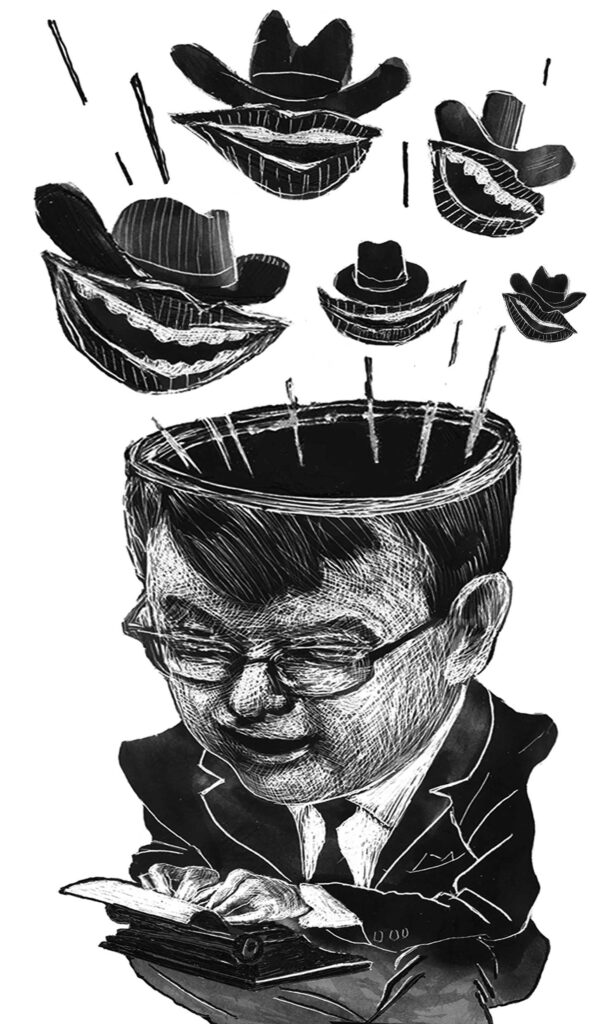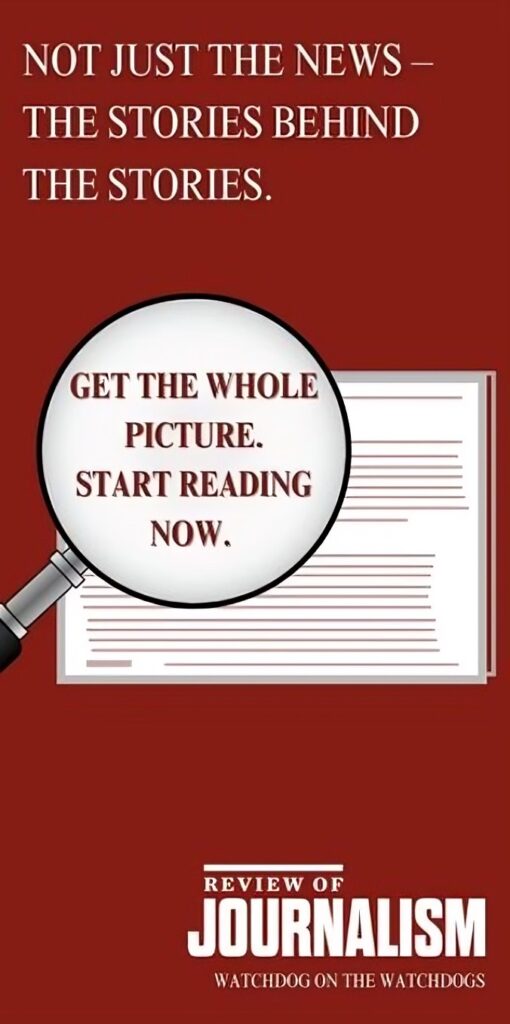Guy Vanderhaeghe, perhaps best known for his three novels set in the Canadian West in the 1870s, discusses his earliest inspirations in a pair of essays in Because Somebody Asked Me To, a collection of past reviews, articles, and speeches. A mix of brief thoughts and carefully articulated arguments, the book includes several pieces that combine autobiography and literary criticism. In the first, “Influences,” from 1984, he ponders how non-literary works read in childhood may be a greater influence for a writer than the highbrow books they often like to cite. He feels free to explore his debt to The Boy’s Own Paper, a children’s periodical filled with tales of British imperial derring‑do, when he learns in Vladimir Nabokov’s autobiography, Speak, Memory, that the author of Lolita also read it, likely at the urging of a governess hired by his anglophile father.
Growing up on a farm near Esterhazy, Saskatchewan, some 200 kilometres east of Regina, with a father who didn’t read, young Vanderhaeghe had little access to the world of books. But a copy of The Boy’s Own Annual, which bound together a year’s worth of the paper, made its way into the Vanderhaeghe home, courtesy of an elderly English widow. As a result, he discovered stories of “plucky youths” ferreting out the Gunpowder Plot, aiding Bonnie Prince Charlie, investigating Arab slavers, and defending the honour of the British Empire.
Those familiar with Vanderhaeghe’s novels might wonder if seeds of their themes were planted during those readings. His three Westerns all deal with the lingering effects of empire on Canada — and especially on the West. In The Englishman’s Boy, from 1996, a young man is taken in by a travelling British actor, abandoned on the frontier, and left to fall in with a group of murderous American wolf hunters. Is he, in some respects, this country? In The Last Crossing, from 2002, two aristocratic brothers, one a sensitive painter and the other a psychopathic adventurer, set off through the West in search of a third brother, a religious mystic and missionary. It’s not hard to see them as three facets of the colonial enterprise. In A Good Man, from 2011, the plot unfolds amid the delicate military and political balancing act that occurred after the Battle of the Little Bighorn, in Montana Territory, when the North West Mounted Police were caught between the vengeful United States Army and Sitting Bull’s exiled band of Hunkpapa Lakota. Famously, the NWMP kept the peace and simply waited for the starving tribe to return and surrender. As Vanderhaeghe’s protagonist observes, “I could almost hear them thinking, ‘Yes, British fair dealing has tamed the savage.’ But as yet, fair dealing has come without a price tag. It has cost us nothing.” Even in his more recent (and longest) novel, August into Winter, from 2021, we see the lingering effects of empire. Set in 1939, the work features as its villain a brilliant narcissist whose eccentricities are written off by townsfolk as the natural result of being raised by an English remittance man, who taught him to believe himself better than his neighbours.

The themes that have lingered in his mind.
Silas Kaufman
Vanderhaeghe notes that along with The Boy’s Own Annual, he read an old schoolbook of his mother’s, A History of the World. That illustrated tome may have set him on his path to write historical novels, the subject of several of the essays and lectures he gathers here.
In a speech to Toronto’s Heliconian Club on the writing of August into Winter, Vanderhaeghe cites the historian Donald Creighton: “History is the record of an encounter between character and circumstance. . . . The encounter between character and circumstance is essentially a story.” There’s certainly a great deal of circumstance in that nearly 500-page novel. The author explains that it grew from an actual event in Esterhazy, in which a talented, eccentric thief killed an RCMP officer who attempted to arrest him. After that, the townspeople formed a posse. In fictionalizing the incident, Vanderhaeghe fills in the characters and explores the circumstances in great depth: the trench life of a pair of veterans who track the killer, the politics of the interwar years, even the Spanish Civil War experience of a local schoolteacher’s lover.
Elsewhere, Vanderhaeghe advocates for the careful use of fiction in the teaching of history. In an essay from 1987, he quotes a vivid passage from A Journal of the Plague Year and shows how Daniel Defoe’s specific details bring the past to life. “Of course, this is not an argument in favour of supplanting the high school history text with novels, plays, and poems,” he writes. “It is an argument for the judicious use of these things (or even short passages from them) to give students a fuller, more complete appreciation of history.”
Vanderhaeghe acknowledges, in an introduction to a 2005 edition of Timothy Findley’s The Wars —“the finest historical novel ever written by a Canadian”— that historical novels are always “as much about the present as the past.” That point is reiterated in the final piece in the book, a talk that he meant to deliver in 2020 at St. Thomas More College, part of the University of Saskatchewan. When the lecture, on Hilary Mantel’s novel Wolf Hall and Robert Bolt’s play A Man for All Seasons, was cancelled because of the pandemic, Vanderhaeghe expanded “From Hero to Villain and Villain to Hero” to its present length. In it, he contrasts Mantel’s portrayal of Thomas Cromwell as a hero with Bolt’s portrayal of him as “evil incarnate.” (The college’s namesake was the lord high chancellor who paid with his head for refusing to authorize Henry VIII’s marriage to Anne Boleyn; Cromwell was the chief minister who helped arrange it, as well as the creation of the Church of England.) The two authors, he argues, interpreted the past in the light of their own times. For Bolt — writing not long after McCarthyism and when left-leaning intellectuals of his generation were finally acknowledging the brutality of Stalin — More was a man of conscience refusing to lie for an all-powerful ruler. Mantel, on the other hand, presents Cromwell, a multilingual, self-made man, as “a statesman bent on making the apparatus of government work for the benefit of the country, a leader who anticipates change and skilfully manages it.” For her, Thomas More is, “at best, agonizingly bad company, a sanctimonious rule-enforcer, reputed to practise self-flagellation and wear a penitential hair shirt.” Her Cromwell stands for “reinvention of the state, a preoccupation that has dominated Britain ever since the Second World War drove home to an exhausted, virtually bankrupt nation that it was now a second-rate power.” Mantel, born in 1952, lived through seventy years of British reinvention.
Appraising Vanderhaeghe’s own novels, it’s tempting to interpret them in light of his experience of Canada. Caught up as a teenager in the excitement around the centennial, which he calls “perhaps the most aggressively upbeat year in the history of the country,” Vanderhaeghe went on to become a late addition to the post-Expo pantheon of CanLit giants when his first book, the short story collection Man Descending, won a Governor General’s Award in 1982. That same year, he made his first attempt to write a novel focusing on one of the most important events in western Canada’s history, the Cypress Hills Massacre. He set it aside for quite a while, eventually revisiting the region’s origins in a work that shares none of the upbeat spirit of 1967. Instead, the protagonist of The Englishman’s Boy sees the Cypress Hills tragedy turned into fodder for a Hollywood film in praise of the American belief in manifest destiny, a cultural betrayal that has parallels with the fading of Canadian cultural nationalism in the post-NAFTA world.
Vanderhaeghe doesn’t just write about history, though. He is history, to the extent that his story reveals how profoundly the literary world has changed in just a few decades. His rise to the top tier of Canadian letters stands out as an example of how the past is a foreign country where they do things differently. He writes in “Luck You Need, When You Need It,” his 2014 Margaret Laurence Lecture, of the chagrin he felt at the time when he took the 1982 Governor General’s Award ahead of Alice Munro, who had blurbed his collection and was shortlisted for one of her own, The Moons of Jupiter. Helping him through his imposter syndrome was a letter of congratulations from Laurence herself. A similar constellation of luminaries comes up later, in a short Globe and Mail memorial he wrote for Avie Bennett, the angel investor who saved McClelland & Stewart in the 1980s. In that piece, from 2017, he refers to being part of an author exodus from Macmillan of Canada to M&S, along with Munro, Robertson Davies, W. O. Mitchell, Mavis Gallant, and Jack Hodgins.
That was a different literary scene than today’s, obviously, nearly monochrome and presided over by a much smaller group of writers whose works were read faithfully by a generation of Canadians seeking to see their nation reflected in print. Of course, it was also a very different Canada; visible minorities still made up only about 3 percent of the population when Man Descending came out. The differences are further illustrated in a few of Vanderhaeghe’s reviews, including one in which he discusses a 2003 collection of 103 John Updike short stories, and it appears he has read all or most of them before. Is there any author today who has both that kind of must-read status and that many opportunities to publish? And how much more rare, in this age of electronic distraction, is that kind of commitment to reading?
While it’s the author’s observations on history that have the most heft in this collection, these brief reports from the literary world — illustrations of the “passing scene,” as the book’s subtitle puts it — make Vanderhaeghe’s collection a valuable historical artifact itself.
Bob Armstrong is the author of Prodigies, an award-winning Western, and, since 2002, the speech writer for Manitoba’s lieutenant-governor.

